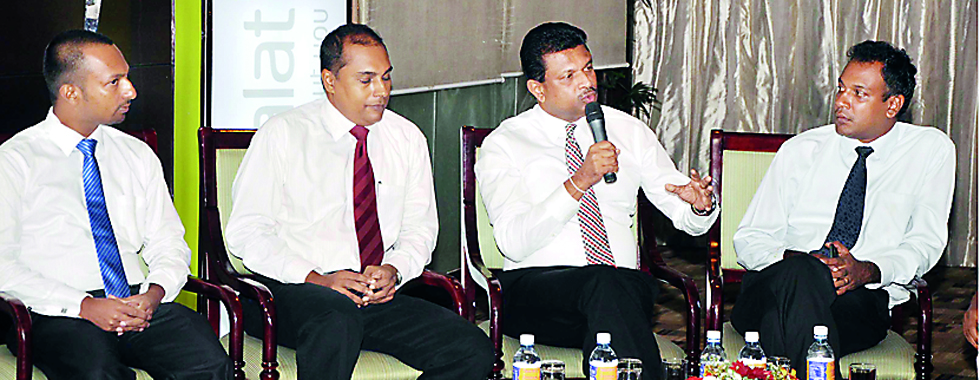Sri Lanka wrongly identified as an agricultural country, Laugfs Chief says at STBC meeting
Sri Lanka continues to be wrongly identified as an agricultural country when there is ample historical evidence to show that the country was a popular trading and merchandise destination carrying out business along the ‘Silk Route’, a self-made successful entrepreneur said this week.

The three speakers with STBC president Chaturanga Perera
Addressing members of the Sunday Times Business Club (STBT) at their monthly meeting on Tuesday at the Cinnamon Lakeside hotel in Colombo during a discussion on ‘Entrepreneurship and its development in Sri Lanka’, W K H Wegapitiya, Chairman, Laugfs Holdigs said Sri Lanka had a trading culture but unfortunately everything turned the other way round, when the foreigners invaded Sri Lanka in the 5th Century. These invaders paralysed the country’s trading and merchant activities.
“When we were schooling we learnt over the years that we are an agricultural nation which is a wrong statement. We have never been an agricultural country, until the 15th century. If one can study Mahawansa or Chulawansa there is evidence that until those Europeans invaded our country we were traditionally a commercial economy,” he said in remarks that traced the history of Sri Lanka economic development. Sri Lankans were the first to sign bilateral agreements since the times of Parakramabahu, Vijayabahu and other kings where under such agreements Sri Lanka was exporting elephants to Burma. Trading was the main economic base while agriculture was developed by using the tax income generated from trading, Mr. Wegapitiya said.
He said that Sri Lanka is endowed with all the essential resources, except diamonds and since the 1st century and up to 15th century Sri Lanka was exporting a range of goods from spices, gems. He said that during the monsoon wind in the East large quantities of ilmenite are deposited. Other countries mine for such material whereas in Sri Lanka they get washed ashore in abundance.
Sharing his experience Mr Wegapitiya said that in the Sri Lankan context becoming an entrepreneur is very painful and a great risk.
He also spoke of a new project that they have begun to transform this ilmenite to titanium dioxide by using Sri Lankan scientists to give a value addition 10 times more than the ilmenite that is exported in raw form. The project involves the production of nano-titanium dioxide, believed to be a new innovation in the world, and used as raw material in paints, pharmaceuticals and alloys. Mr. Wegapitiya said nano-titanium enriched paints would enable colours on a wall to change automatically from day-time to night-time, having painted the wall in just one colour. The technology is just like the simple Nelum Leaf in which water don’t absorb or stay. In the case of nano-titanium paints, any dirt doesn’t stick on the wall, it can be washed away.
Nishan Silva, a SME entrepreneur and founder director of Nedron Consolidated, said that he had all the luxuries as a professional marketer employed by a company and if he had stayed in another five years he would have been promoted as a director.
However he decided to step out into the risky world of entrepreneurship and with small beginnings started to sell computer parts from a small room. There was a lot of resistance to his decision from family and friends who said he committing economic suicide.
Nevertheless, he ventured into this sector and has not looked back, growing in success. He advised those who want to become entrepreneurs not to depend on banks. “Bankers would give an umbrella (finance) but it would be taken back when it is raining,” he said highlighting how he approached banks with some purchase orders, creating some credibility and securing funding.
Samantha Kandagoda, Head, Financial Education, WIZMA. Global Education and Virtual Education, provided an academic approach to entrepreneur and said that while the textbook approach towards starting a business may not be practical, there are some values and learning from these teachings.
Etisalat, the mobile service provider, is the sponsor of the club with Hameedia as the co-sponsor and Cinnamon Lakeside as the host hotel.
comments powered by Disqus

